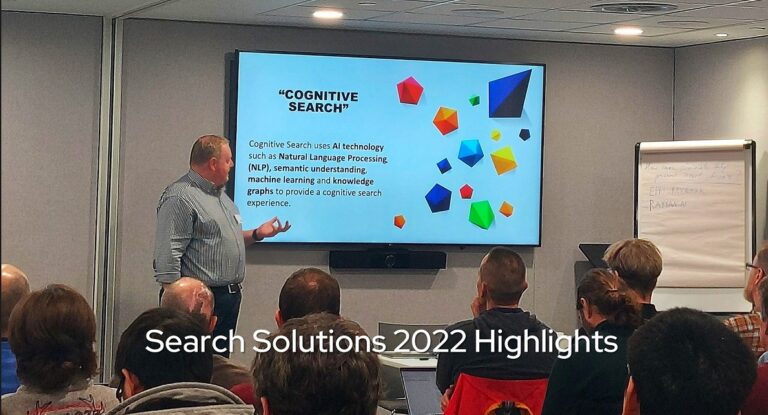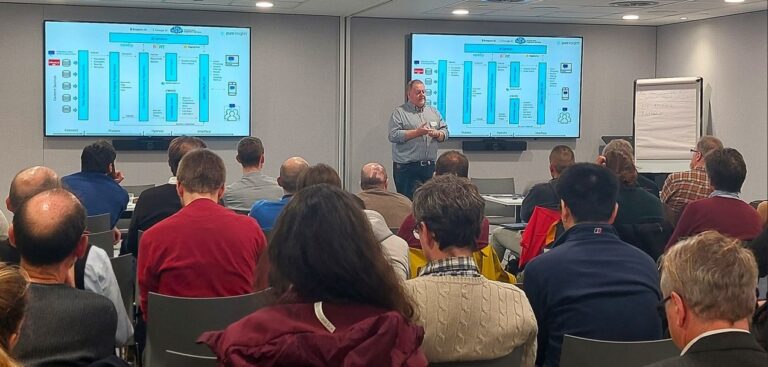

Martin Bayton
Key Takeaways from the British Computer Society Annual Conference on Search
Last week we attended Search Solutions 2022 in London where Phil Lewis our CTO gave a presentation on ‘Practical Applications of Knowledge Graphs and AI in Search’. For those of you who don’t know, Search Solutions is the British Computer Society Information Retrieval Specialist Group’s annual event focused on practitioner issues in the arena of search and information retrieval. More information can be found here: BCS IRSG It was a well organised informative event with presentations from a range of organisations all focused on aspects of search and retrieval.
The agenda was divided into four sessions each with a different theme. Here are my takeaways.


Session 1: The Search Experience: Focus on the Users
There were two presentations in the first session.
LexisNexis: How to conduct empathetic user research to test the search experience of users
For me, the key takeaways from this presentation were “You are not your user,” to provide an excellent search experience you need to understand user behaviour through both quantitative and qualitative research. And at the end of the day people just want to find the information they need as quickly as possible. The presenter referenced the Golden Circle theory developed by Simon Sinek and the importance of organisations understanding why they do what they do. Ergo, the need to take feedback from users.
State Library of Queensland (via video link): The Topography of Searching: Visualising search data
The examples of topographic maps, generated from the words and phrases that appeared in the searches made by people using the Queensland library catalogue, were just amazing. You could instantly see the value of a visual representation mapping search queries over time. Check it out at: The Topography of Searching
Session 2: Beyond keyword search: Semantic/conversational/audio search
The second session featured three presentations.
Spotify: Finding the Right Audio Content for You
Spotify spoke about the difference in behaviour patterns when people search for music or podcasts. Term-based search didn’t really cut it for the exploratory natural language queries people were using to find podcast material, so they have invested in vector/sematic search technologies.
Bloomberg: Taking Question Answering from Research Prototype to Product
Bloomberg talked about their journey building Q&A functionality into their service and the ability to provide a text ‘snippet’ that best answers a question. I discovered that incorporating real-time Q&A i.e., ‘what is the answer right now’ can be challenging. You can find out more about Bloomberg Tech here: Tech at Bloomberg
Google: Challenges with Really Understanding Natural Language in Conversational Recommendation
A key takeaway from the Google presentation was that in some instances the gap between search and recommendation engines is getting narrower. Hearing about Google’s research on interpretation and measurement of soft attributes for recommendation was fascinating. You can find out more about interpreting natural language in recommender systems here: Google Research Soft Attributes
Session 3: Search with an impact: Searching health-related information
The third session also featured two presentations.
Institute of Health Informatics, University College London: The Futures of Systematic Searching
Another absorbing presentation saw the Institute of Health Informatics explain the importance of systematic literature reviews in health care research and how the key to the success of any review is the search strategy used to identify relevant literature. I liked their ideas on the characteristics of future search tools and in particular ‘simplicity at the user end with complexity at the back end,’ ‘open’ and ‘goodbye search, hello answer.’ Spot-on! Still curious? more information here: Search strategy formulation for systematic reviews: Issues, challenges and opportunities
University Hospitals Coventry & Warwickshire NHS Trust: A Programmable Search – A Solution to Finding Guidelines and Patient Information?
UHCW NHS Trust had a problem finding and retrieving clinical guidelines (NICE) and Patient Information Leaflets (PILS) so they devised an innovative and cost-effective way of solving the problem using Google Programmable Search. In essence, they used their expertise to create a custom search across a specific collection of sites that contained the guidelines and information leaflets they needed to access. Simple but effective. They overcame a few problems along the way such as duplication and dead links and are now investigating use of synonyms, query additions and extra customisation using the programmable search element API. Kudos to the team that worked on this worthwhile project.
Final session: A world beyond web search: Enterprise search
The final session at Search Solutions 2022 featured two presentations, including Pureinsights’ own CTO, Phil Lewis.
France Labs: Combining Spacy with Datafari Community Edition to enable semantic Enterprise Search
The guys from France Labs spoke about combining Spacy with Datafari their open source enterprise search solution based on Solr, Elasticsearch and the Apache ManifoldCF connector framework. They gave a demonstration that included Name Entity Recognition. Their open source stack also includes Apache Zeppelin (web-based notebook that enables data-driven, interactive data analytics), Cassandra (NoSQL distributed database), Tomcat (pure Java HTTP web server) and Tikka (content detection and analysis framework). They obviously have a lot of open source expertise and their approach made sense.
Pureinsights: Practical Applications of Knowledge Graphs and AI in Search
Phil talked about how it is possible to bring Google-like functionality into the workplace by enhancing traditional search engines with AI technologies and a Knowledge Graph. Adding Natural Language Processing (NLP) and Machine Learning (ML) enables search engines to extract and deliver the most relevant answer, in the form of a featured snippet, in response to a natural language query. And in combination with a Knowledge Graph, they can provide direct answers to factual questions. He then described an architecture that brought all this functionality together and demonstrated it in action using the Pureinsights Discovery Platform.


Summary of Search Solutions 2022
In summary, I really enjoyed hanging out with so many experienced ‘search people,’ had some thought-provoking conversations and expanded my knowledge about search. And as a bonus there was a good lunch! Congratulations to all the presenters and organisers for delivering such an engaging event.
If you have any questions or feedback, please CONTACT US or reach out at info@pureinsights.com
Best Regards,
– Martin